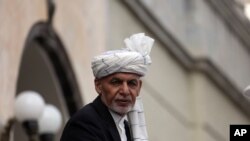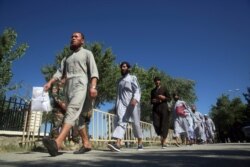AAfghan President Ashraf Ghani announced his government would soon complete the release of 5,000 Taliban prisoners, thus paving the way for the start of long sought-after peace negotiations with the insurgent group.
“With this action, we look forward to the start of direct negotiations with the Taliban in a week’s time. We call on the Taliban to join us at the negotiating table and to conclude promptly a permanent and comprehensive ceasefire,” he said, adding that a Taliban commitment to a ceasefire during the upcoming Muslim holy festival of Eid will be “an indication of things to come.”
Almost on cue, soon after the end of his speech, the Taliban announced a ceasefire for the “three days and three nights of Eid-al-Adha” expected to start late Thursday or early Friday.
The two announcements came at a time when Zalmay Khalilzad, the United States special representative for Afghanistan reconciliation was on his way to Kabul.
The intra-Afghan negotiations were supposed to take place in March, 10 days after the U.S. signed a landmark deal with Taliban.
They were supposed to start in March, 10 days after the U.S. signed a landmark deal with the Taliban to help end the war. The deal, designed to help the U.S. bring its troops home within 14 months in exchange for counterterrorism guarantees, promised a prisoner exchange of up to 5,000 Taliban in exchange for up to 1,000 Afghan security personnel.
However, the Afghan government, which felt sidelined in that deal, was hesitant to release prisoners that it felt could be an important negotiation tool to convince the Taliban to announce a ceasefire.
The militant group insisted it would not join any negotiation without the release of its prisoners. Until last week, even after the government released more than 4,000 Taliban, there was a dispute over around 600 Taliban prisoners that the government said were hardcore criminals involved in vicious attacks.
As pressure from the international community, particularly from the U.S., mounted, both sides blamed the other for the delay in starting the process.
In his Eid message Tuesday morning, hours before Ghani’s speech, Taliban top leader Hibatullah Akhundzada said the exchange of prisoners “should not have been delayed by the other side” calling it a part of “building trust and shortening our path towards that end.”
Meanwhile, even as he announced the release of prisoners, Ghani not only accused the militants of killing civilians with rocket attack, he also alleged the Taliban were maintaining ties with al-Qaida and other terrorist groups in violation of the U.S.—Taliban deal.
The intra-Afghan negotiations, as the upcoming talks are called, will pit a team of Taliban against a team of various Afghan factions—the government, civil society, political parties, women etc. They are supposed to hash out what the future of the country should look like once foreign forces withdraw.
Human rights and women’s rights groups have long feared a return to the brutal Taliban rule of the 1990s, when women were not allowed to go to school and music was banned, and a loss of human rights gains made since the U.S. led invasion of Afghanistan in 2001.
Several European countries have insisted on the presence of women in all levels of the negotiating teams.
Akhundzada’s message seemed to be an effort to allay some of those concerns.
“Every individual in society is entitled to exercise all the rights and privileges of life and have their political and social status determined on the basis of merit and piety,” he wrote.
At another point in the message he also tried to answer the concerns of those who think Taliban would like to wrest control from the government by force once foreign forces withdraw.
“Our clear message remains that we are not looking for monopoly over power because all the diverse Afghan tribes and ethnicities are in need of one another,” said Akhundzada.
Still, the message also talks about “establishing a pure Islamic government,” words that make some activists worry that the Taliban would try to interpret Islam in their own obscurantist way.
While multiple countries are on the table as possible venue for the intra-Afghan negotiations, the spread of the novel coronavirus has complicated the logistics.
The first round may be held in Doha, the capital of Qatar, where a political team of Taliban has been living for years and where it negotiated for almost a year and a half with Khalilzad and his team.












